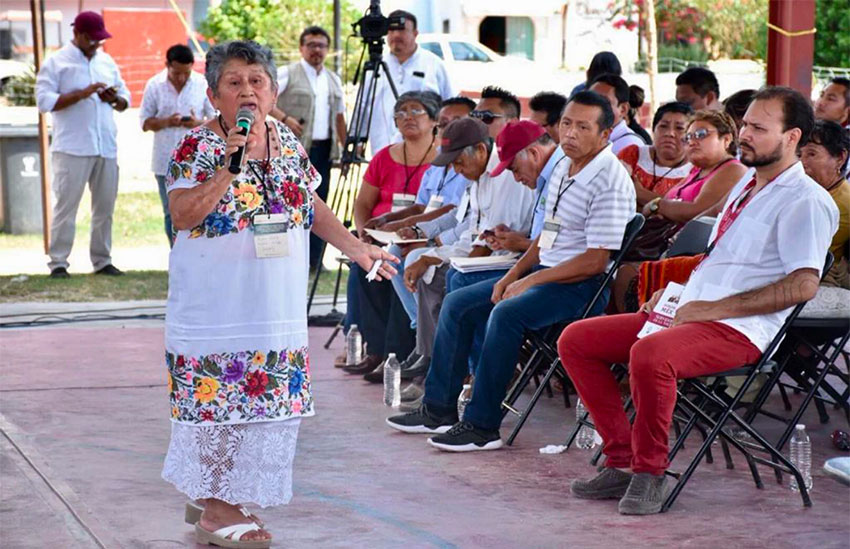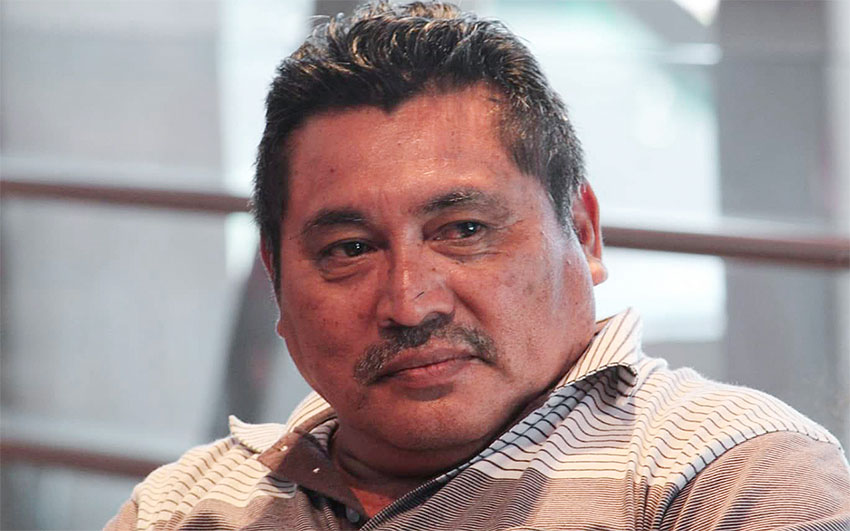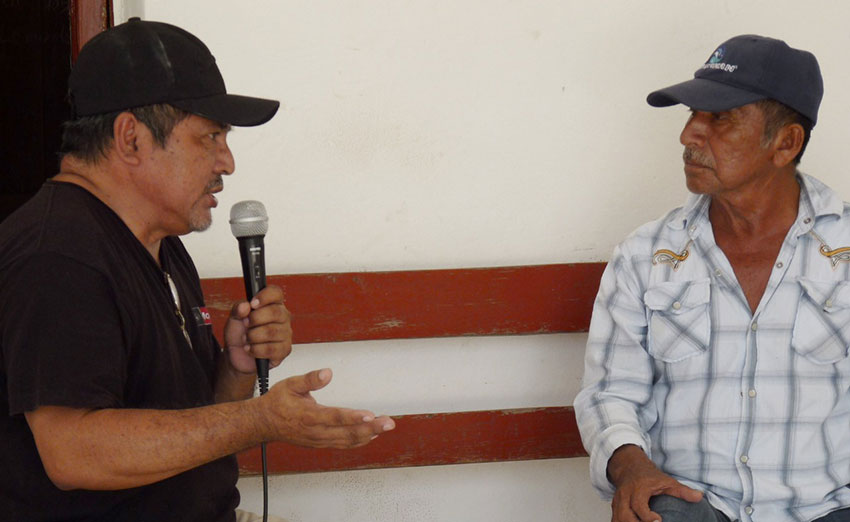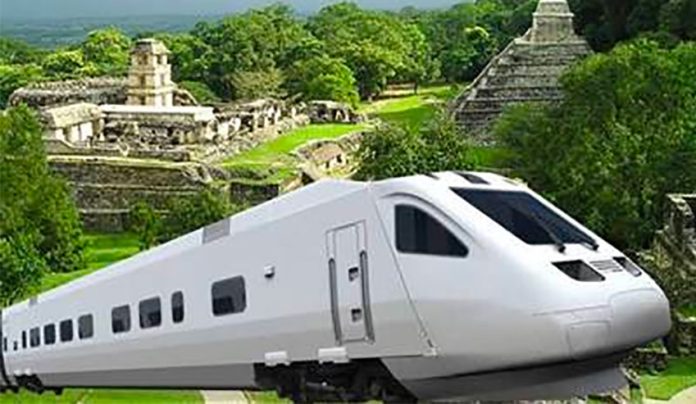Shortly after he was sworn in as president, Andrés Manuel López Obrador promised the indigenous communities of Mexico — who have historically had their voices silenced and their needs marginalized — that they would have priority in the development of new social programs.
In the south of the country at least, the promise proved to be short-lived with the announcement of projects such as the Maya Train and aggressive expansion of renewable energy and pig farming industries creating divisions and tensions in the very communities they purport to benefit.
Running 1,500 kilometers through southeastern Mexico, the Maya Train has birthed deep controversy, particularly because it plays into the same recurring narrative of externally imposed decisions which has affected indigenous communities for the last 500 years. Multiply this by the Mexican government seemingly unwilling to acknowledge the adverse ecological and environmental — and now archaeological — impacts it will have in the region, and the beginnings of a perfect storm are taking shape in the country’s south.
Which is not to say that the Maya Train is a one-off, rather an extension of a neoliberal modus operandi which — whatever your politics — transparently and singularly fails to take into account genuine local opinion, storing serious, systemic problems for the future of all involved projects and “megaprojects,” as well as for the society they are to exist within.
Beyond the rails being laid, prior even to the completion of environmental impact surveys, the Yucatán peninsula has also become a new focal point of large scale meat production, with industry growth seeing 3.5% more meat produced nationally in July 2020 compared to July 2019, despite public health consequences.

While there is a chance that ongoing restrictions as a result of Covid-19 may impose some regulations on the expansion of the livestock industry in Mexico, a great deal of the damage has already been done to communities in the tropical south, whose lands and livelihoods have already been affected by mass swill lagoons and depletion and pollution of groundwater sources which serve local communities.
It is little wonder, therefore, that community groups across the south are becoming increasingly vocal in their opposition to the continued bulldozing of their lands to make way for immense and disruptive infrastructure development. What before was whispered discontent is now turning into peninsula-wide calls for retribution, and even — on occasion — militancy.
The president’s standard response to resistance to his proposed projects is that there is a hidden political motivation to the criticisms of indigenous communities, with other parties implied to be fomenting and funding opposition.
Just last week he accused environmental groups of working on behalf of paid organizations, both within the country and abroad, to oppose the Maya Train. It is a defence uttered because he knows his supporters will find traction in his words, and while undoubtedly there are pockets of funded rebellion in areas where dominion was historically set to a particular party, the essential truth on the ground is a far cry from López Obrador’s paranoid accusations.
Pedro Uc Be, for instance, of the Múuch Xíinbal Assembly of Defenders of the Maya Territory, talks of how the organization is necessarily apolitical, not because they do not hold political positions, but because they and their ancestors recognized that there was no fundamental difference between one party and another in Mexico’s flawed democracy.
“We want to take care of what little we have left; we have had 500 years of aggression, of invasion, of colonization and these years have actually left us with a complicated, difficult situation.” Their backs are to the wall, and Pedro Uc Be understands — just as the UN does these days — that land and environmental custodianship and indigenous rights are not separate entities, but a necessarily intersected fabric which offers the only way forward for oppressed communities and overt, systemic environmental degradation.

Recognizing the need to appear to have consulted locally vis a vis the contentious train, the López Obrador administration organized meetings with individuals with vested interests through several regional assemblies. These took place, however, before the environmental impact assessment of the project had even been commissioned, with scant mention of how the project would involve not simply a train but also the construction of development hubs at each of the stations.
Meetings also took place in areas unrelated to the train, participation in person was insisted on even though local and federal governments had established lockdowns, information provided was coercive rather than consultory, and many resistance groups were denied access to meetings for reasons related to “lost or incorrectly filed paperwork.”
“In reality these aren’t consultations at all,” says Pedro Uc Be, “but propagandist meetings held with individuals standing to economically profit from the development, and not communities as a whole. People aren’t in favor of the train, but there certainly are people who are misinformed, who have been manipulated, people who actually don’t understand nor have been properly informed of the fundamentals of this project. If they had been real consultations, women would have been invited to participate, and they weren’t. What is a community meeting without the voice of the mothers and grandmothers of the region?”
His tone as is calm, concerted, and focused, but there are plenty of others whose anger feels as though it is riding a thin edge. Within the communities of La Ermita and Camino Real in Campeche, bisected by the rails of the train, significant sections of the community are to be forcibly relocated and hearing despairing voices is the norm.
“There are people here with papers signed by Porfirio Díaz, thanking their great grandparents for allowing the old train to pass through here,” says Lourdes Ganzo. “Four hundred and thirty families are to be evicted, and these historic, traditional neighborhoods were here before the old railway lines were built. Even then there was never a legal right established to give the railway right of passage.
“Nobody has ever tried to destroy our houses until this government, without even asking for our papers demonstrating our legal rights. We have been threatened — our own president has been declaring that it is going to happen, nothing is going to stand in its path. We are being sentenced to being socially and culturally overrun by a high-speed train.”

In a record year in Latin America for killings of indigenous land protectors, Pedro Uc Be’s opposition to unsustainable tourism, renewable energy projects, and the Maya Train has brought its own personal backlash.
He and his family have received threats from organized crime units, at best wanting to silence him, at worst … We know how the story ends. And while López Obrador is busy criminalizing the work of civic groups and non-profits working to protect the land, the insidious possibility that the government has mobilized organized groups to threaten Mayan communities — who are standing up against the violation of their social and land rights — poses a real and immediate threat to the lives of individuals.
It is deplorable, laments Pedro Uc Be, that a president who took up the mantle of leadership with such legitimacy is today using that same legitimacy to crush what little Mayan communities have left, privileging instead the interests of the large organizations, like Fonatur, a government agency.
“The president continues to lie and falsify information, at the expense of indigenous cultures. We’re tired, exhausted even, but we’re not giving in. We are all that we have left.”
